
-
Find the right food for your petTake this quiz to see which food may be the best for your furry friend.Find the right food for your petTake this quiz to see which food may be the best for your furry friend.Featured products
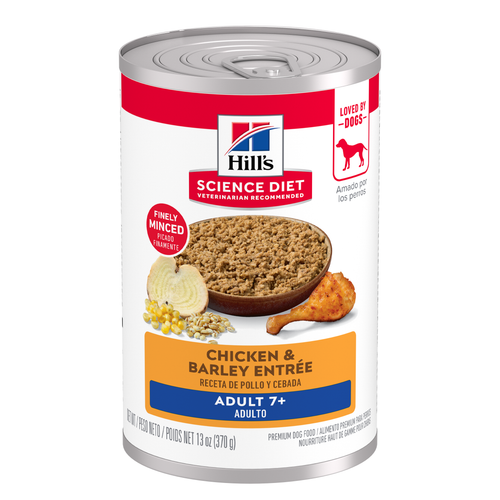 Adult 7+ Chicken & Barley Entrée Dog Food
Adult 7+ Chicken & Barley Entrée Dog FoodChicken & Barley Entrée in a delicious loaf with precisely balanced nutrition to support mobility and muscle mass for older dogs
Shop Now Adult Large Breed Chicken & Barley Recipe Dog Food
Adult Large Breed Chicken & Barley Recipe Dog FoodSupports healthy joints, lean muscle, and beautiful coat for large breed dogs
Shop Now Adult Chicken & Barley Recipe Dog Food
Adult Chicken & Barley Recipe Dog FoodSupports lean muscle and beautiful coat for adult dogs
Shop NowFeatured products Adult 7+ Indoor Chicken Recipe Cat Food
Adult 7+ Indoor Chicken Recipe Cat FoodSupports energy level and beautiful fur in mature indoor cats
Shop Now Adult Turkey & Liver Entrée Cat Food
Adult Turkey & Liver Entrée Cat FoodPrecisely balanced nutrition with the delicious taste of minced turkey & liver to help fuel the energy needs of cats during the prime of their life
Shop Now Senior Vitality Adult 7+ Tuna & Vegetables Stew
Senior Vitality Adult 7+ Tuna & Vegetables StewImproves Everyday Ability to Get Up & Go
Shop Now -
Dog
- Dog Tips & Articles
-
Health Category
- Weight
- Food & Environmental Sensitivities
- Urinary
- Digestive
- Joint
- Kidney
-
Life Stage
- Puppy Nutrition
- Adult Nutrition
- Senior Nutrition
Cat- Cat Tips & Articles
-
Health Category
- Weight
- Skin & Food Sensitivities
- Urinary
- Digestive
- Kidney
-
Life Stage
- Kitten Nutrition
- Adult Nutrition
Featured articles What Is Littermate Syndrome? Pet Adoption Guide
What Is Littermate Syndrome? Pet Adoption GuideLearn more about littermate syndrome in dogs and cats and how to successfully navigate adoption and early socialization processes.
Read More How to Properly Mix Wet & Dry Pet Foods
How to Properly Mix Wet & Dry Pet FoodsAn Orange cat eating from a bowl filled with mixed food
Read More The Science Behind Our Love for Pets
The Science Behind Our Love for PetsLearn the scientific reasons why we have such strong connections with our pets, and what science says about the love between humans and our furry friends.
Read More -


As the proud parent of a new kitten, you need kitten food that aligns with their nutritional needs in order to keep them active and healthy as they grow up. And because these bundles of energy have different nutritional needs than their older, occasionally less active counterparts, you don't want to take a one-size-fits-all approach to feeding.
Consider your kitten's specifics (speak with your veterinarian first, especially if your kitten has any health concerns), and use the following guidelines to find the food that'll help them become the happiest and healthiest they can be.
Fatty Acids and Proteins
It's so important to find the right food because poor nutrition can increase your kitten's risk of obesity, poor muscle and bone development, and weak immune response. Luckily, pet food manufacturers are required to identify the life stage for which their product is intended, making your job a lot easier. As the pet parent, however, it's up to you to determine which kitten food product is best for your young cat, starting with nutrients.
When searching for the right kitten food, look for a product that contains the fatty acid DHA, commonly found in fish oil and helpful to brain and eye development, as well as folic acid for proper cell growth. Taurine, an amino acid, is another important ingredient that aids in the proper function of the heart, immune system, digestive process as well as with vision.
Look for a food that provides your little one with energy from protein for darting around the house when you're asleep or at work. Sources of protein come from meat and high-quality grains, such as chicken, tuna, corn, wheat or barley. Choose a product that has at least one of these in the top three or four slots on the ingredient list.
Food Texture
When you first bring home your furry friend, experiment with both dry and canned food. As PetMD points out, certain medical conditions that are common later in life, such as diabetes or kidney disease, may warrant canned food as part of a management plan. You'll want to offer your kitten both dry and wet food to familiarize them with a variety of textures so feeding is easier down the road if they are required to eat canned food for health-related reasons.

Your vet can advise you on whether dry and/or wet food is best for your kitty, but avoid supplementing or "wetting" your kitten's food with milk. It can upset their digestive system and may cause diarrhea.


Tasty Tips
Portions and Timing
Kittens have tiny tummies, as you can imagine, so aim for three small meals until they are 6 months old (then drop to 2 per day) rather than 24-hour "free feeding" access to their food, which can lead to bad eating habits in adulthood. Follow the recommendation on the pet food package and adjust to your kitten's needs.
Kittens' little mouths and teeth are another important reason not to feed your furry baby an adult cat food just yet; each large kibble can be a choking hazard. Dry formulas are often made in smaller, kitten-bite-sized pieces for your littlest housemate.
What to Avoid
In general, stay away from kitten food that doesn't contain the proteins, vitamins (Vitamins C and E help support a healthy immune system), and fatty acids necessary for your kitten's healthy growth and development. Pet food companies aren't required to provide information on the food label about the sourcing or quality of their product, so it's best to purchase products from reputable, well-known brands that can and will provide you with the information you need.
Starting your kitten off with proper nutrition is a vital step in helping them grow into an active, healthy cat and provide you with love and companionship for many years to come.


Christine O'Brien is a writer, mom, and long-time cat parent whose two Russian Blues rule the house. Her work also appears in Care.com, What to Expect, and Fit Pregnancy, where she writes about pets, pregnancy, and family life. Find and follow her on Instagram and Twitter @brovelliobrien.
Related products
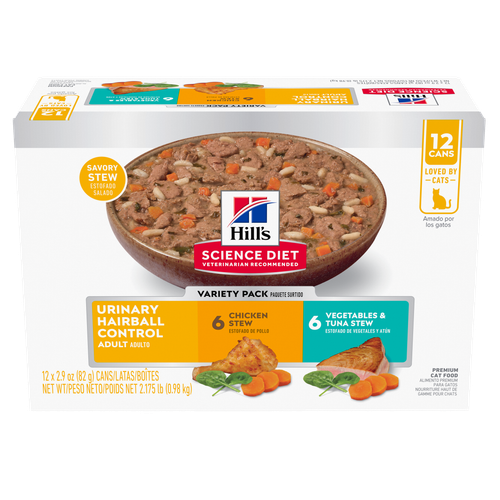
Supports the health of the whole urinary system with optimal levels of magnesium
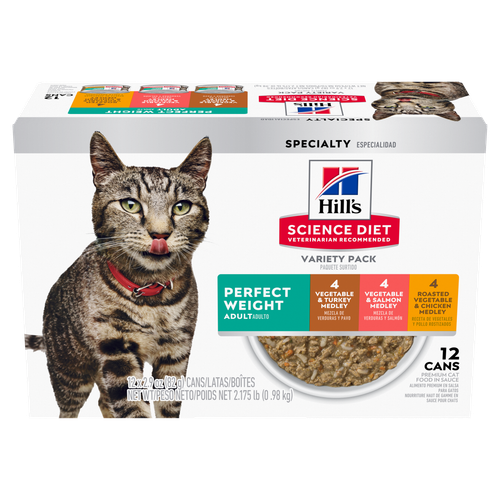
Over 70% of cats lost weight within 10 weeks when fed this nutrition
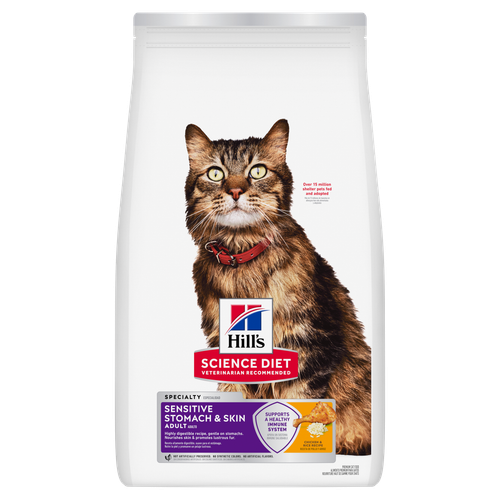
Science-backed nutrition tailored for skin and digestive health, packed with clinically proven, immune system supporting antioxidants.
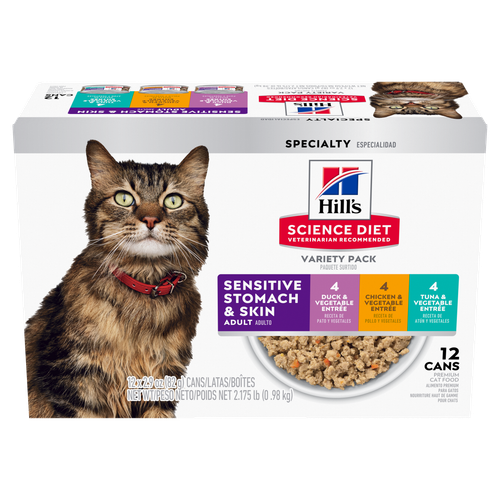
Science-backed nutrition tailored for skin and digestive health, packed with clinically proven, immune system supporting antioxidants.
Related articles

Discover how to train your cat, starting with very basic first steps that both reward good behavior and discourage the bad.

Learn how to litter train a kitten with this guide to potty training, including when to start litter training kittens and troubleshooting tips.

When you adopt a cat, you don't just gain a best friend; you also save her life. Here's why getting a cat from a local animal shelter makes so much sense.

Discover which cat toys games your feline friend might like, and how they are great sources of exercise. Explore our library of articles to learn more.

Put your cat on a diet without them knowing
Our low calorie formula helps you control your cat's weight. It's packed with high-quality protein for building lean muscles, and made with purposeful ingredients for a flavorful, nutritious meal. Clinically proven antioxidants, Vitamin C+E, help promote a healthy immune system.
Put your cat on a diet without them knowing
Our low calorie formula helps you control your cat's weight. It's packed with high-quality protein for building lean muscles, and made with purposeful ingredients for a flavorful, nutritious meal. Clinically proven antioxidants, Vitamin C+E, help promote a healthy immune system.

